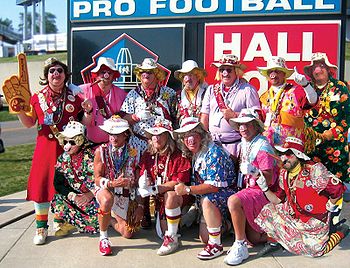
The Washington Commanders are a professional American football team based in the Washington metropolitan area. The Commanders compete in the National Football League (NFL) as a member of the National Football Conference (NFC) East division. The team plays its home games at FedExField in Landover, Maryland; its headquarters and training facility are in Ashburn, Virginia. The team has played more than 1,000 games and is one of only five in the NFL with more than 600 total wins. Washington was among the first NFL franchises with a fight song: "Hail to the Commanders", played by their marching band after every touchdown scored by the team at home. The franchise is owned by a 21-member group, headed by Josh Harris, that acquired the team from Daniel Snyder in 2023 for $6.05 billion.
"Hail to the Commanders" (HTTC) is the fight song of the Washington Commanders, an American football team belonging to the National Football League (NFL). At home games, the song is performed by the Washington Commanders Marching Band when the team scores a touchdown. Composed in 1937, the song was performed as "Hail to the Redskins" until 2019, when the team retired the controversial Redskins name.

Daniel Marc Snyder is an American businessman who formerly owned the Washington Commanders, an American football franchise belonging to the National Football League (NFL). He bought the team, then known as the Washington Redskins, from the estate of former owner Jack Kent Cooke in 1999. In 2023, he sold the franchise to a group led by Josh Harris for $6.05 billion, the highest price ever paid for a sports team.

Joseph John Bugel was an American football coach in the National Football League (NFL). For many years, he was acknowledged as the greatest offensive line coach in the league, particularly with the Washington Redskins under head coach Joe Gibbs in the 1980s. He was the architect behind "The Hogs", the Redskins' dominant offensive line that helped lead them to three Super Bowl wins.

Russell Scott Grimm is an American former professional football player who was a guard for the Washington Redskins of the National Football League (NFL). He has also served as an assistant coach for the Redskins, Pittsburgh Steelers, Arizona Cardinals, and Tennessee Titans. As a professional, Grimm had multiple selections to both the All-Pro and Pro Bowl teams, and was inducted into the Pro Football Hall of Fame in 2010. Grimm played 11 seasons for the Redskins and was a first-team selection to the NFL 1980s All-Decade Team.
The Hogs were a nickname given to the offensive line of the Washington Redskins of the National Football League during the 1980s and early 1990s. Renowned for their ability to control the line of scrimmage, the Hogs helped the Redskins win three Super Bowl championships under head coach Joe Gibbs. The Washington Commanders pay homage to the Hogs with their mascot, Major Tuddy.
George Lawrence Starke is an American former professional football player who was an offensive tackle for the Washington Redskins of the National Football League (NFL) from 1972 to 1984.
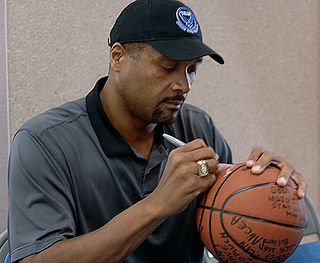
Mark Eric May is an American former professional football player who was a guard for 13 seasons in the National Football League (NFL) during the 1980s and 1990s. May played college football for the Pittsburgh Panthers and earned unanimous All-American honors. He was selected in the first round of the 1981 NFL Draft, and played professionally for the Washington Redskins, San Diego Chargers, and Arizona Cardinals.
James Michael Lachey is an American former professional football player who was an offensive tackle for 10 seasons in the National Football League (NFL) with the San Diego Chargers, Los Angeles Raiders, and Washington Redskins.

The Washington Commanders, an American football team belonging to the National Football League (NFL), have also played as the Boston Braves, Boston Redskins, Washington Redskins, and Washington Football Team. Founded in 1932, the team has won five professional American football championships including two NFL Championships and three Super Bowls. Washington has also captured 15 NFL divisional titles and five NFC championships. The Redskins branding used by the team from 1933 to 2019 was seen as pejorative by various Native American groups and was retired in 2020 due to pressure from several NFL and team sponsors as part of a wave of name changes in the wake of the George Floyd protests. The team played as the Washington Football Team for two seasons before rebranding as the Commanders in 2022.
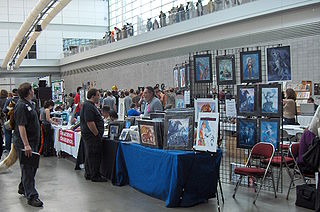
A furry convention is a formal gathering of members of the furry fandom – people who are interested in the concept of fictional non-human animal characters with human characteristics. These conventions provide a place for fans to meet, exchange ideas, transact business and engage in entertainment and recreation centered on this concept. Originating in California, United States, during the mid-1980s, as of 2016 there are over 50 furry conventions worldwide each year.

Barrel Man, real name Tim McKernan, was a superfan of the Denver Broncos. In all types of weather for 30 years, he attended every home game at both Mile High Stadium and INVESCO Field at Mile High wearing nothing but an orange barrel that covered his torso and a cowboy hat and boots. His costume was reminiscent of rodeo clowns who serve as a distraction to animals in the rodeo arena in order to protect riders who have been thrown and of the stereotype of the miner who lost his stake and had nothing left to wear but a barrel. He was the first Broncos fan inducted into the VISA Hall of Fans at the Pro Football Hall of Fame.
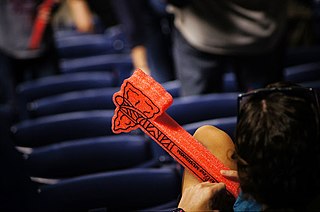
Since the 1960s, the issue of Native American and First Nations names and images being used by sports teams as mascots has been the subject of increasing public controversy in the United States and Canada. This has been a period of rising Indigenous civil rights movements, and Native Americans and their supporters object to the use of images and names in a manner and context they consider derogatory. They have conducted numerous protests and tried to educate the public on this issue.
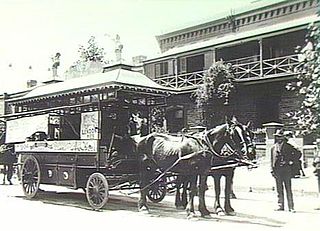
Prosh at the University of Adelaide is organised by the Adelaide University Union. Prosh began in 1905, students used the occasion to poke fun at established South Australian institutions such as the horse-drawn trams. Prosh began as a procession through the City of Adelaide. In recent years the prosh parade has involved live bands on the back of flatbed trucks, floats created by student clubs and various inebriated groups of students being transported by booze cruisers. A prosh newspaper is published for the week. Prosh week has developed into a time to raise funds for charities. Many 'stunts' are registered with the organisors and are held in prosh week. The stunts are nominally undertaken to acquire funds for the official Prosh charitable cause. Prosh week winds up with the Prosh After Dark social event in the Uni Bar, originally a Prosh Ball was held during the week.

Zema Williams, better known as Chief Zee, was a well-known fan and unofficial mascot of the franchise then known as the Washington Redskins, which has since been renamed the Washington Commanders of the National Football League. Dressed in a faux Native American war bonnet, rimmed glasses, and red jacket, Chief Zee began attending Redskins games in 1978.

Pig farming or pork farming or hog farming is the raising and breeding of domestic pigs as livestock, and is a branch of animal husbandry. Pigs are farmed principally for food and skins.

The Washington Redskins name controversy involved the name and logo previously used by the Washington Commanders, a National Football League (NFL) franchise located in the Washington metropolitan area. In the 1960s, the team's longtime name—the Redskins—and the associated logo began to draw criticism from Native American groups and individuals. The topic, part of the larger Native American mascot controversy, began receiving widespread public attention in the 1990s. In 2020, the team responded to economic pressure in the wake of widespread recognition of systemic racism by retiring the name and logo. The team called itself the "Washington Football Team" before rebranding as the Commanders in 2022.
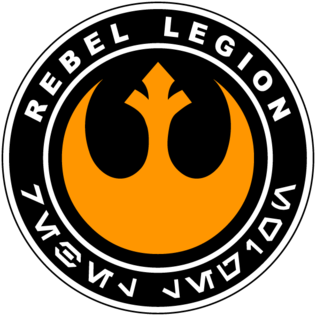
The Rebel Legion is an international fan-based volunteer organization dedicated to the construction and wearing of screen-accurate replicas of the Rebel Alliance, the Galactic Republic, the New Republic, the Resistance, the Jedi Order, and other heroes from the Star Wars universe. Founded in 2000, the group was formed in response to the decision of sister organization the 501st Legion to remain dedicated to Galactic Empire costumes. The Rebel Legion makes appearances at private and public events, including charitable events and official Star Wars promotional events. The organization does not charge a fee for appearances, instead encouraging a donation to a charity.
The Kansas City Chiefs is one of the professional sports teams involved in the controversy regarding the use of Native American names and imagery, but received less attention than other teams until 2013 when fan behavior at games, including stereotypical headdresses, face paint, performing a "war chant" and tomahawk chop became more publicly known. Protests by change advocates intensified following the name changes of the Washington Commanders and Cleveland Guardians. In addition, the Chiefs have been highly visible due to their participation in the Super Bowl in 2019, 2020, and 2022. Native American groups once again demonstrated outside the stadium hosting Super Bowl LVII.
